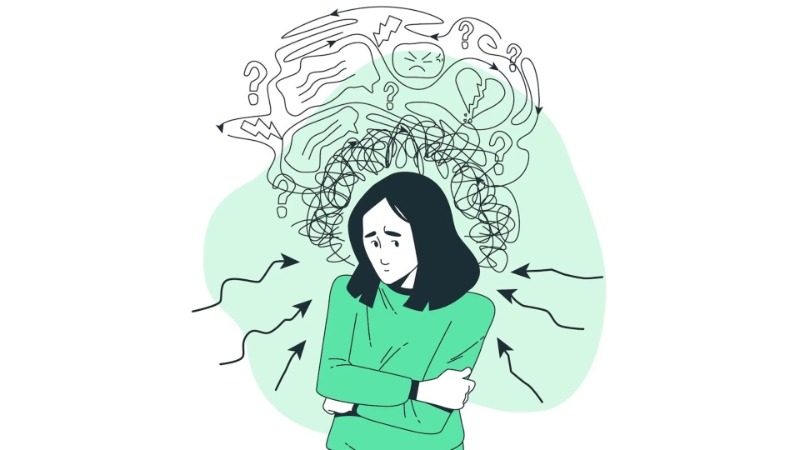
Bipolar disorder, characterized by extreme mood swings between manic highs and depressive lows, is a complex mental health condition. However, within the spectrum of bipolar disorders, there exists a variant that adds an additional layer of complexity: bipolar disorder with psychotic features.
In this comprehensive exploration, we will delve into the nuances of bipolar disorder with psychotic features, examining the symptoms, challenges, and effective management strategies.
Understanding Bipolar Disorder with Psychotic Features

Bipolar disorder with psychotic features, a subtype within the bipolar spectrum, extends beyond typical mood swings. It involves not only highs and lows but also episodes of psychosis, including hallucinations and delusions. Impaired insight complicates recognizing the unreality of thoughts during these episodes.
This interplay of mood disturbances and psychosis indicates a more severe form of bipolar disorder. Diagnostic complexity requires a nuanced approach, and effective management involves a tailored combination of mood stabilizers and antipsychotic medications, with ongoing adjustments for dynamic symptoms.
Understanding this subtype is crucial for individuals, families, and healthcare professionals, fostering empathy and providing targeted support for an improved quality of life.
Key Features of Bipolar Disorder with Psychotic Features
- Mania and Psychosis: In bipolar disorder with psychotic features, manic episodes are not just marked by high energy and impulsivity, but also by psychotic symptoms like hallucinations and delusions.
- Depression and Psychosis: During depressive phases, individuals may experience intense sadness and hopelessness, often accompanied by psychotic symptoms such as paranoia or auditory hallucinations.
- Episode Severity and Frequency: The inclusion of psychotic features typically signifies a more severe form of bipolar disorder, characterized by more frequent and intense episodes, leading to significant daily life disruptions.
- Impact on Insight: Psychotic symptoms can greatly affect a person’s awareness of their condition, often hindering their ability to recognize the irrationality of their thoughts and complicating treatment adherence.
- Co-Occurring Disorders: This form of bipolar disorder often exists alongside other mental health issues like anxiety or substance use disorders, adding complexity to both diagnosis and treatment.
Diagnosis: Distinguishing Bipolar Psychotic Features from Other Disorders

Accurate diagnosis of bipolar disorder with psychotic features necessitates a meticulous and comprehensive evaluation by mental health professionals. Given the shared presence of psychotic symptoms in various mental health conditions, particularly schizoaffective disorder or schizophrenia, the diagnostic process becomes a nuanced exploration.
It involves detailed patient history, symptom assessment, and sometimes neuroimaging or other diagnostic tests. This multifaceted approach is crucial to unravel the complexities of the individual’s mental health and formulate an effective, tailored treatment plan.
Challenges in Managing Bipolar Disorder with Psychotic Features
Delayed Diagnosis
The presence of psychotic symptoms can sometimes lead to a delayed diagnosis of bipolar disorder. Individuals may initially be misdiagnosed with schizophrenia or another psychotic disorder, hindering the implementation of appropriate treatment.
Medication Challenges
Managing bipolar disorder with psychotic features often involves a combination of mood stabilizers, antipsychotics, and sometimes antidepressants. Finding the right medication balance can be intricate due to the need to address both mood and psychotic symptoms.
Impact on Relationships
Psychotic features can strain relationships, as loved ones may struggle to comprehend the nature of the symptoms. Delusions or hallucinations can create challenges in communication and understanding.
Functional Impairment
The severity and frequency of episodes, coupled with the cognitive impact of psychosis, can lead to significant functional impairment. Individuals may find it challenging to maintain employment, attend school, or engage in daily activities.
Effective Management Strategies

Medication Adherence
Consistent adherence to prescribed medications is crucial for managing bipolar disorder with psychotic features. Medications, including mood stabilizers and antipsychotics, play a pivotal role in stabilizing mood and reducing the frequency of psychotic episodes. Regular communication with healthcare professionals ensures a collaborative approach, allowing adjustments to medication plans as needed based on the individual’s response.
Psychoeducation
Education about the nature of bipolar disorder with psychotic features is vital for individuals and their families. This includes understanding the intricate interplay between mood and psychotic symptoms. Psychoeducation goes beyond awareness, encompassing practical coping strategies.
Recognizing triggers, understanding warning signs, and developing effective crisis management plans contribute to empowering individuals to navigate their conditions more effectively.
Therapeutic Support
Psychotherapy, particularly cognitive-behavioral therapy (CBT) and psychoeducation-focused approaches plays a central role in managing this complex disorder. These therapeutic interventions aim to enhance insight, develop effective coping skills, and establish connections between thoughts, feelings, and behaviors.
Regular therapy sessions provide ongoing emotional support and guidance, fostering resilience and aiding in the overall management of symptoms.
Monitoring Triggers and Warning Signs
Individuals and their support networks should remain vigilant in identifying triggers and warning signs indicating potential mood or psychotic episodes. Early recognition allows for prompt intervention, preventing the escalation of symptoms. Keeping a personal journal or utilizing mobile apps to track moods and behaviors can be beneficial, providing valuable insights for both the individual and their healthcare team.
Supportive Environment
Establishing a supportive and understanding environment is crucial for individuals managing bipolar disorder with psychotic features. Family and friends play a vital role in providing emotional support, understanding the challenges, and actively participating in treatment plans.
Creating a stable routine and fostering open communication contribute to a supportive atmosphere, enhancing the individual’s overall well-being and ability to cope with the complexities of the disorder.
Conclusion: Navigating the Complexity

Bipolar disorder with psychotic features represents a complex intersection of mood disturbances and psychosis, presenting unique challenges for individuals and their families. Effective management requires a comprehensive approach that integrates medication, psychoeducation, therapeutic support, and a supportive environment.
Navigating beyond the spectrum of bipolar disorder to address the intricacies of psychosis demands a personalized and empathetic approach. By fostering awareness, understanding, and access to appropriate care, we can empower individuals with bipolar disorder with psychotic features to lead fulfilling lives despite the challenges posed by this complex mental health condition.












